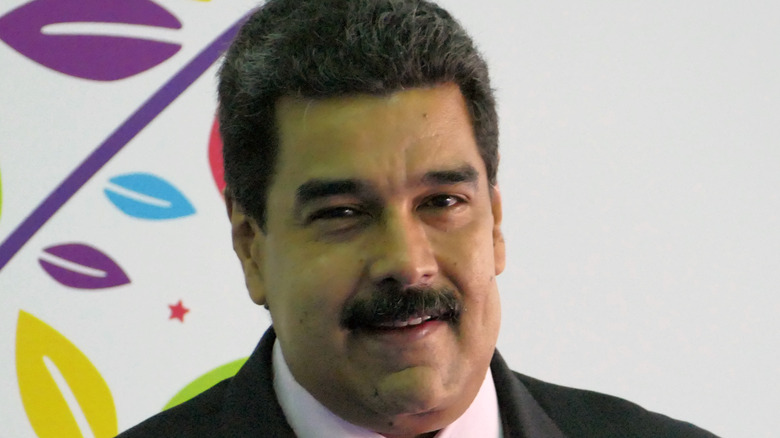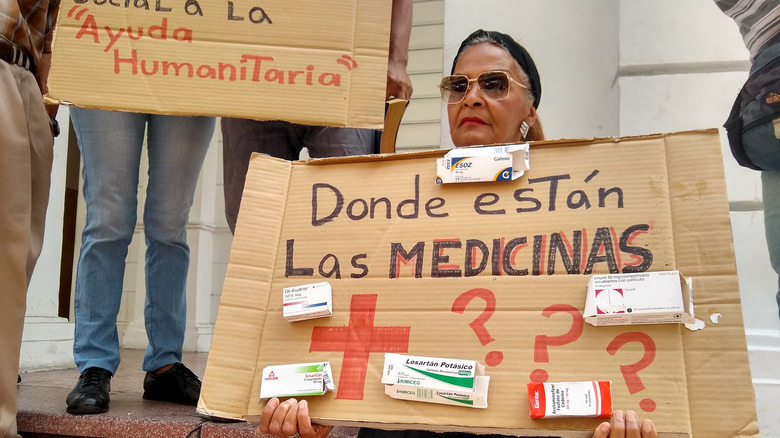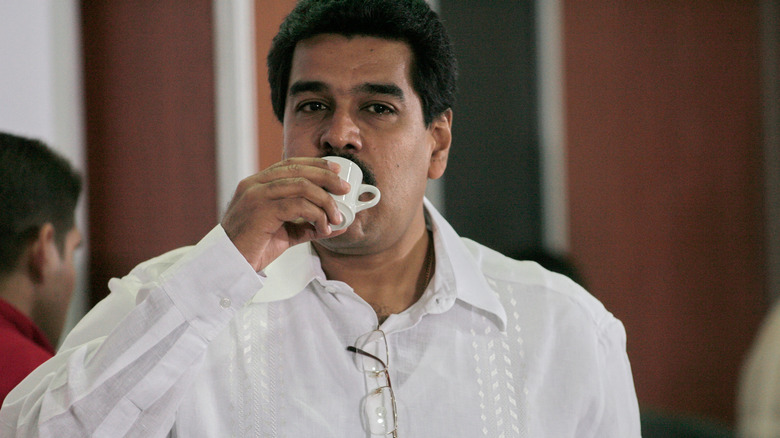The Messed Up Truth Of Venezuelan President Nicolas Maduro
Nicolás Maduro considers himself the president of Venezuela, and for several years he has acted as such, yet the U.S. and more than 50 other nations refuse to recognize him as the legitimate leader of the South American nation. That's because, according to the BBC, when Maduro was elected as president for the second time in 2018 — after first being elected in 2013 in a special election following the death of former Venezuelan president, Hugo Chavez — that election was largely considered rigged.
Maduro, a former bus driver and member of Venezuela's transit union, worked his way up the political ladder starting in 1992, when he campaigned for Chavez's release from prison. Chavez was serving time for an attempted coup against then Venezuelan President Carlos Andres Perez, according to CNN. By 1998 Chavez was released and elected president, according to the Council of Foreign Relations, and CNN reported that Maduro, who spent more than a decade in elected official rolls in the early aughts, was named Chavez's vice president in October 2012. By March 2013 Chavez was dead and Maduro took over.
Maduro, like Chavez, stands on the political platform of "chavismo," also called "the fifth republic." According to the Borgen Project, the political movement had its roots in populism, and promised the poor and lower classes that the system of governing would improve their lives.
The US government has a warrant out for Maduro's arrest
The oil-rich nation would use its profits to help improve education, reduce poverty and "establish social justice and social welfare within Venezuela," the Borgen Project reported. The government would invest in social welfare programs, they said. Chavismo was supposed to give a voice to all the people, and to "oppose what is seen as imperialist U.S. policies that put capitalistic gain ahead of basic human rights," but it isn't working out that way.
Today, 5.6 million of the 30 million who lived in Venezuela have left since 2015, according to the Center for Disaster Philanthropy. People are fleeing because food is unaffordable, and jobs and medicine are scarce, ABC News reported. All the while, hyperinflation is plaguing the nation. The local currency, known as the bolivar, has little value anymore. Maduro's Venezuela, in short, is a mess.
Instead of lifting up the poor, the socialist efforts of the Maduro regime are causing a humanitarian crisis in the country, the Center for Disaster Philanthropy reported. Meanwhile, the U.S. Department of State has issued a $15 million reward for information leading to an arrest of Maduro, who they say is involved in narco-terrorism and illegally possesses machine guns and destructive devices.
Francisco Toro is the editor of Caracas Chronicles; Moisés Naím is an author and former contributing editor at The Atlantic. Together, the two journalists explained in 2018 (via The Atlantic) that the problem is that Maduro is "painfully out of his depth ever since he took over the presidency ...
Maduro can run for president an indefinite number of times
"Five years later," they said, "he has no achievements of any kind to show for his time in office, save for managing the considerable feat of hanging on to power through a crisis that would've seen off any leader even slightly interested in his people's well-being."
Toro and Naim said that they don't think Maduro even knows how to reverse the shambles he's led his country into, but at this point his goal is to remain in power, because if he is ousted, the only thing that waits for him is "very likely a jail cell. Or worse."
Besides the narco-terrorism charges, Maduro, his attorney wife, and their inner circle are also facing international charges of bribery and embezzlement, environmental crimes, human rights abuses, money laundering, aiding Hezbollah, and accusations of false imprisonment and torture, according to The Atlantic. But while he remains the de facto president of Venezuela, he has the support of the nation's military, who according to Reuters have more responsibilities and more power since Maduro took over.
The next presidential election in Venezuela is in 2024. Maduro can seek re-election as many times as he wants, according to Georgetown University's Political Database of the Americas.
HBO Max premieres the documentary "A La Calle," about the Venezuelan people's fight to reclaim their country from Maduro, on September 15. The trailer is posted on YouTube.


